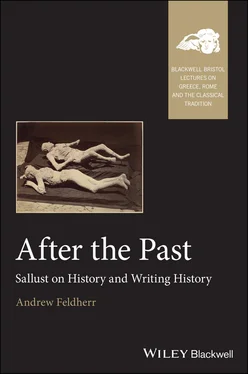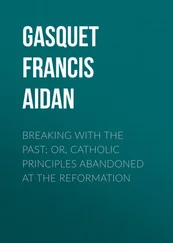Sallust’s condemnation of the morality of his time can appear so vehement and comprehensive as to raise the question of why he writes history at all. If people are as bad as he says, who is there to profit from his exhortations to virtue or to take seriously his criticisms of vice? Conversely, the very fact that he does write has sometimes been taken to affirm that his pessimism had its limits. “It is not that Sallust believes that history has no power. He must do, as he continues to write it.” 32However, in addition to emphasizing the premise that to write history at all is a sign of hope, the “must” in this quotation makes clear that finding such a purpose in Sallust’s work requires a leap of faith on the part of his reader.
My own engagement with Sallust has from the first been inspired by wanting to understand why he writes. And, indeed, this book represents the answer I have arrived at. Perhaps inevitably I have come to believe that the question itself is not imposed by contemporary academic categories (What kind of a historian is Sallust?), but that the monographs compel their audience to address it by withholding any clear statement of authorial purpose. There are to be sure many good answers available, assumptions about why Sallust writes as he does, that can consistently guide a reading. And yet even where he perhaps comes closest to defining what his work will do for its audience, in his evocation of the example of ancestral images as prompts to virtue, the crucial equation with his own history is never quite stated. 33As elsewhere, the compression of his writing requires the reader to supply what he has left unsaid, and by doing so invites scrutiny of what might seem obvious and fundamental.
Hence the most important aspects of my understanding of Sallust’s aims are at once their openness and the engagement they consequently demand of his audience. It is by no means unparalleled for a contemporary historian to recognize that his work will offer something different to readers with different backgrounds and interests. Dionysius of Halicarnassus, writing a few decades after Sallust, proclaims as much: “Those interested in political speeches will find them, those studying philosophical speculation will find it, and if any seek from historical reading undisturbed diversion, my work will seem sufficient to them as well.” 34Indeed, as we shall see, the alternatives of models for political action, philosophical speculation, and diversion align quite closely with the reading strategies I will be considering for making sense of Sallust. But, again, the absence of a clear invitation to multiple readings, as with the avoidance of an explicit declaration of Sallust’s own intentions, means that the choices individual readers make involve a more uncertain negotiation with the author. For in addition to the familiar alternatives of utility and pleasure, Sallust’s readers may be drawn by the nature of his material and the account he gives of himself to more oppositional assumptions about the historian. Perhaps he writes to mask his own complicity in the worst vices of his times, avarice and ambition, and to settle scores against those who have condemned him. 35The kind of decisions we make in reading about the power the author has over our interpretation take on, in his case, a political charge that draws them back to the history his work describes. Note that Kraus’ assertion implies already that Sallust had a purpose, and that his purpose matters to us: he believes history has “power.” While Latte depicts an author fundamentally condemned to failure by the time in which he lived (a generation later and he could have taken genuine satisfaction from an intellectual career), 36crucial to Syme’s vindication of Sallust thirty years later is his assertion of the historian’s mastery over his material and literary techniques. 37Such language, as we will see, connects these readers’ conception of the author to Sallust’s own moral vocabulary. He grounds his description of the virtue that defines worthwhile human activity on the opposition between power and slavery ( Cat . 1) and opens the Jugurtha by resisting the claim that our lives are “ruled” by chance rather than virtue. Thus as our own choices about how to read Sallust condemn or exalt us by revealing an interest in pleasure or virtue so our simultaneous struggle perhaps to evade his judgment, perhaps to identify his own place inside or outside the moral universe he has constructed, link with special urgency our act of reading to the subject of our reading and become a simultaneous ethical evaluation of ourselves and the author. And at a moment when representations of public events provoke such disbelief and suspicion, this reminder of the moral stakes of reading history, whatever the claims made by its authors, seems especially important.
1 1 For the dates of Sallust’s birth and death, see Syme (1964, 13–14).
2 2 See, for a fuller introduction and overview, Grethlein (2013, 1–6), and the collection of Powell (2013).
3 3 Helpful orientations in Batstone (2009) and Grethlein (2013, 4–9).
4 4 Pp. 268–308. Grethlein’s emphasis on the teleological aspects of Sallust’s Catiline contrasts with Batstone’s (1990) descriptions of the work’s narrative as aiming at mimesis of contemporary uncertainties about the conspiracy, see esp. p. 119.
5 5 An important precedent for understanding this internal dynamic will be found in Scanlon (1987), esp. pp. 67–8, who demonstrates how the theme of hope within both monographs creates a tension between the often revolutionary expectations of the characters and the knowledge of the impartial historian. His interest in using this tension to construct Sallust’s view of the present, and especially the alternatives of non-participation he poses for the historian and his audience, also anticipate my own emphases.
6 6 For impartiality as a prerequisite for historiographic authority in antiquity, see Marincola (1997, 158–74). For various approaches to the epistemological inadequacy of historical narrative, I refer the reader to Grethlein’s introduction (2013, 9–14).
7 7 A full and useful history of the debate, with further bibliography, will be found in La Penna (1968, 68–83). For its earliest stages, see Schindler (1939). Influential portrayals of Sallust as a pro-Caesarean polemicist include Mommsen (1854–6, v.3, 177n.) and Schwartz (1897); the shift in momentum away from this approach owed much to Klingner (1928).
8 8 Syme (1964, 2): “Sallust is at the same time an artist, a politician, and a moralist—the elements so fused and combined that he seems all of one piece.”
9 9 See esp. Wiseman (1979) and Woodman (1988), both discussed in Chapter 2.
10 10 Batstone (1988, 1990, 2010a, 2010b); Gunderson (2000); Kraus (1999); Kraus and Woodman (1997); Levene (1992, 2000); Sklenář (1998). My reference to the commonalities of these scholars’ attention to the formal aspects of Sallust’s work of course overshadows many differences. Especially crucial is the question of where Sallust as an author stands in relation to the hermeneutic challenges of his texts. How much does he as author critique and describe disorder and dissimulation in history, and how much does his text become part of the confusion it describes and subject itself, intentionally or not, to contradictory and hostile interpretation by its readers? In addition to the rhetorical turn in anglophone scholarship, it is also important to signal how the work of Rambaud (1953) on Caesar has especially fostered a distinct continental tradition of studying the effects of historiographic texts as literary representations, see Devilliers (2012, 258–9).
11 11 Another important precedent for the approach to Sallust’s text deployed here comes from O’Gorman’s (2000) monograph on Tacitus, both in her efforts to make the historiographic representation “embody a political judgment” (p. 2) and in her discussion (based on White 1978, 128) of the ironic mode of historiography as implying a contrast between representation and reality (pp. 10–14). This despite the differences between the Tacitean examples of irony, which target, predominantly, an imperial representation of the past, and Sallust’s highlighting of the competition faced by any such representation, including his own.
Читать дальше












